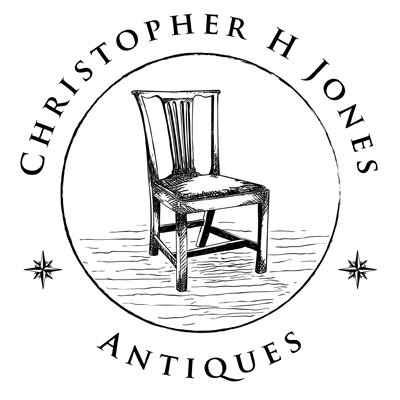 Dumfries or Central Virginia
Dumfries or Central Virginia
Possibly the shop of or an associate of Mardun Vaughn Eventon (d.1778)
Circa 1770
Width 39 ½” Depth 18 ½” Height 84”
Commentary: This desk and bookcase, with a recent history in Alexandria, is a fine example of the preference of Virginians for the “neat” workmanship and stylistically “plain” features associated with English cabinetmaking. Constructed of three components, a slant-front writing desk with a fitted interior and astragal paneled prospect door, an upper bookcase with adjustable shelves and a removable dentiled cornice; it was certainly the work of a skilled artisan fully familiar with the construction and stylistic tastes of his sophisticated clientele. (While period and possibly from the same shop, the bookcase was probably a later addition.) The desk can be linked in terms of both style and construction to a group of case furniture attributed to the shop of Mardun Vaughn Eventon (d.1778) by furniture historians at MESDA and Colonial Williamsburg. In discussing the signed Eventon desk at Colonial Williamsburg and other related pieces, authors Ron Hurst and Jonathan Prown note that scholarship relating to Eventon is particularly challenging due to the “eccentric nature of Eventon, his personal and professional history [and] the eclectic nature of his furniture.” (Southern Furniture Page 464) Similarly, Luke Beckerdite concludes in his pioneering article on Eventon in the MESDA Journal (Nov. 1984) that “variations in the style and construction of the…[Eventon] group show that a steady stream of tradesmen passed through Eventon’s shop…[and] some case pieces have interrelated features and histories that allow [attribution to] journeymen cabinetmakers who had worked in Eventon’s shop, but the exact locus of their production is uncertain.” While this desk could well be the work of Eventon or a cabinetmaker trained in his shop, because a number of these details are also broadly characteristics of case furniture from other Virginia cabinet shops, no firm attribution can be made in the absence of additional evidence.
The signed Eventon desk and bookcase in the collection of Colonial Williamsburg represents the high point of Eventon’s craft and is superior in style and workmanship to any of the other desks or chests now attributed to his shop. While the Williamsburg desk achieves a level of refinement unsurpassed by other known pieces, it provides evidence of construction techniques and stylistic preferences that have allowed furniture historians at MESDA and other institutions to identify a group that can be attributed to Eventon’s shop. These features, which are shared with the subject desk include:
Through-tenoned mitered battened fallboard
Integral feet and base molding
Backboards set into routed channel on sides and top (horizontal rather than vertical)
Drawers set on horizontal runners mortised to blades
Runners nailed to the case with roseheads – no dustboards
Pigeon hole dividers are set into dadoes and have glued on brackets
Exposed dovetails on front of drawer blades
Side boards blind dovetail on desk top and half blind dovetailed to the bottom
Large drawer bottoms beveled and set into grooves on the front and sides (although the grain is horizontal) and flush nailed at the back.
Secondary woods are yellow pine and poplar
It is also notable that the prospect compartment drawer, interior and escutcheon of this desk are similar to MESDA S- 6701 which Beckerdite attributes to Eventon.
Eventon appears in Virginia records as early as 1762 as a cabinetmaker in Dumfries where court documents mention both Mardun and Maurice – a kinsman of undetermined relationship. In the same year, merchant John Glassford of Dumfries detailed several transactions with Eventon involving a side table, dining table and several other pieces of furniture. Eventon’s business must have been flourishing to the extent that he was unable to recruit skilled assistants in the local market as evidenced by a 1763 ad he placed in the Pennsylvania Gazette seeking “TWO or three Journeyman Cabinet Makes, that can work will in any common Branch in the Cabinet or Chair way; … are desired to apply to MARDUN VAGHN EVENTON, at Dumfries, in Virginia, on the main Post Road from Annapolis to Williamsburgh. N. B. Virginia Money will be paid to such Journeymen as will come quickly.” (While no evidence has emerged to date that Eventon had an Alexandria shop he was clearly linked to the town. When he died in 1778 his will specified that his son George should receive “all the Cloaths &. Effects I have at Alexandria…Now in possession of John Gorbil…”) Eventon attributed furniture has been identified with histories of ownership across central eastern Virginia, while Eventon himself appears in records in King William, Prince William, Henrico, and Chesterfield Counties. Eventon died in 1778, possibly from illness or injuries relating to his service in the Revolutionary War as a member of the 5th Virginia Regiment.
Examples of Eventon’s work can be found in the collections of Colonial Williamsburg, Kenmore, and MESDA.
Condition: Old surface cleaned and consolidated. Drawer runners were heavily worn and were rebuilt to prevent further damage. The base molding and upper portions of the feet are original. The feet have been extended based on a pattern from another desk from Eventon’s shop and the lost blocking replaced with appropriate components. A single backing board on the bookcase has been replaced and minor repairs made to the dentils molding and cornice. The majority of the brasses are old replacements.
Price: Sold
Additional Photos
Detail of open desk



